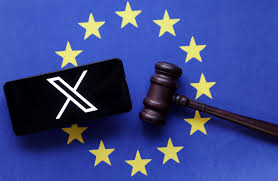The European Union (EU) has issued a warning to the social media platform X, indicating that it may calculate fines by factoring in revenue from Elon Musk’s other enterprises, including Space Exploration Technologies Corp. (SpaceX) and Neuralink Corp. This approach could significantly amplify the potential penalties for non-compliance with content moderation regulations outlined in the EU’s Digital Services Act (DSA).
Under the DSA, the EU has the authority to impose fines of up to 6% of a company’s annual global revenue for failing to adequately address illegal content, disinformation, or for not adhering to transparency requirements. Regulatory authorities are currently evaluating whether to consider sales from Musk’s other companies—such as SpaceX, Neuralink, xAI, and the Boring Company—alongside X’s social media revenue in determining the potential fines against the platform. Sources familiar with the situation, who requested anonymity due to the confidential nature of the information, indicated that this could lead to substantially larger fines for X.
The European Commission has been scrutinizing X for several possible violations of the DSA, a set of newly introduced regulations aimed at ensuring that platforms effectively manage illegal content. The EU is at the forefront of a global initiative to combat harmful online content and misinformation, an effort that has drawn increasingly vocal criticism from Musk, who claims such regulations impede free speech.
As X is a privately held company solely controlled by Musk, the Commission is essentially considering whether Musk himself should be treated as the liable entity rather than X alone. However, revenue generated by Tesla Inc. would not be included in this calculation, as the company is publicly traded and not under Musk’s complete control, according to one of the sources.
As of now, the Commission has not made a definitive decision regarding penalties for X, and the magnitude of any potential fines remains a topic of discussion. X could potentially avoid penalties if it implements measures that address the concerns raised by regulators.
The platform would also have the opportunity to contest any EU decision; however, the final determination would be in the hands of the Commission. X has yet to respond to requests for comment, but Musk has previously stated on the platform that he intends to “fight any DSA fine through a very public battle in court.”
The investigation into X was initiated under Thierry Breton, the EU’s former tech chief, who frequently clashed with Musk online. Breton had been granted special powers to enforce the DSA without needing the Commission’s approval. After Breton resigned in September, he transferred his authority to Margrethe Vestager, who oversees competition and digital policies. Ultimately, decisions regarding penalties and their calculations will fall under Vestager’s jurisdiction. Commission spokesperson Thomas Regnier clarified, “The obligations under the DSA are addressed to the provider of the very large online platform or very large online search engine. This applies irrespective of whether the entity exercising decisive influence over the platform or search engine is a natural or legal person.” Regnier did not provide further details specific to this case, leaving the situation in a state of uncertainty as both X and the EU navigate this complex landscape




